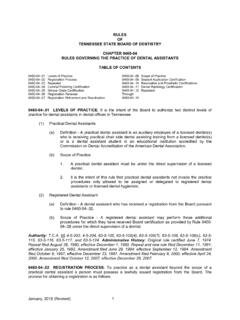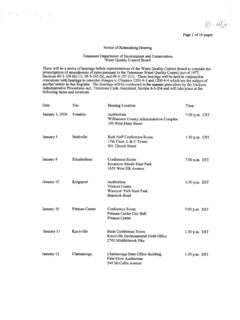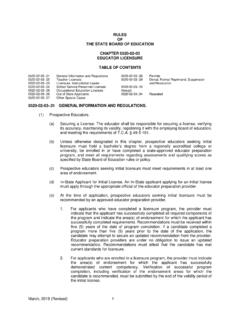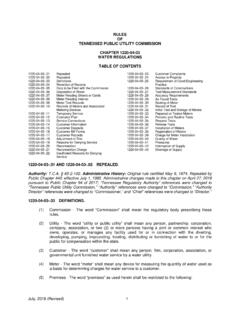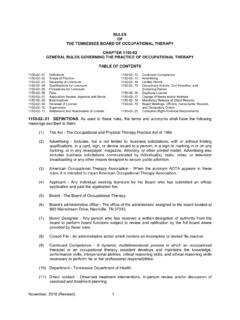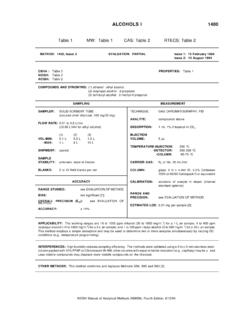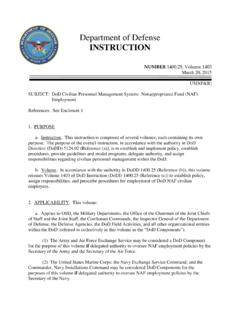Transcription of RULES OF THE TENNESSEE CORRECTIONS INSTITUTE …
1 January, 2018 (Revised) 1 RULES OF THE TENNESSEE CORRECTIONS INSTITUTE CORRECTIONAL FACILITIES INSPECTION CHAPTER 1400-01 MINIMUM standards FOR LOCAL CORRECTIONAL FACILITIES TABLE OF CONTENTS Preface Food Services Basic Information Mail and Visiting Definitions Inmate Programs and Activities Physical Plant Medical Services Administration/Management Admission, Records and Release Personnel Hygiene Security Supervision of Inmates Discipline Classification Sanitation/Maintenance PREFACE. (1) Under the authority of 41-4-140, the TENNESSEE CORRECTIONS INSTITUTE is required to establish minimum standards for local jails, lock-ups, workhouses and detention facilities in the state and conduct an annual inspection of each facility. (2) Local correctional facilities are the first step in the handling of the arrested offender and in it he receives his first impression of the correctional process.
2 His experience in a county jail or a municipal lock-up facility will be a potent force molding his attitude toward law enforcement officials, the correctional system and the community itself. (3) The Board of Control of the TENNESSEE CORRECTIONS INSTITUTE hopes that in carrying out the responsibilities of TENNESSEE Code Annotated 41-4-140, avenues of communication and cohesiveness will be developed with local agencies that will tend to upgrade the correctional system in the State of TENNESSEE . Authority: 41-4-140. Administrative History: Original rule filed August 8, 1982; effective September 9, 1982. Repeal and new chapter filed June, 1984; effective September 11, 1984. BASIC INFORMATION. (1) Statutory Authority: The standards contained in this document are authorized pursuant to 41-4-140 to establish minimum standards for the inspection of local jails, lock-ups, workhouses and detention facilities.
3 (2) Categories Covered by standards : The minimum standards established and recorded herein will cover the following categories: (a) Physical Plant (b) Administration/Management (c) Personnel (d) Security (e) Discipline MINIMUM standards FOR LOCAL CORRECTIONAL FACILITIES CHAPTER 1400-01 (Rule , continued) January, 2018 (Revised) 2 (f) Sanitation/Maintenance (g) Food Services (h) Mail and Visiting (i) Inmate Programs and Activities (j) Medical Services (k) Admission Records and Release (l) Hygiene (m) Supervision of Inmates (n) Classification (3) Other standards : Nothing contained in these standards shall be construed to prohibit a city, county, or city and county agency operating a local correctional agency from adopting standards governing its personnel and facility, provided such standards meet or exceed and do not conflict with the standards established and recorded herein. Nor shall these standards be construed as authority to violate any state fire safety standards , building standards or health and safety codes.
4 (4) Validity: In determining the application of these minimum facility standards , the TENNESSEE CORRECTIONS INSTITUTE Board of Control has enacted the following: (a) standards contained herein shall apply to specific types of local correctional facilities as noted at the end of each standard. For the purpose of this document, primarily adult jails or workhouses that house inmates for over seventy-two (72) hours will be considered Type I; primarily adult jails that house inmates for no more than seventy-two (72) hours will be considered Type II; and primarily adult jails that house inmates no more than twelve (12) hours will be considered Type III. Type III does not include facilities used primarily for fingerprinting, photographing, interviewing or interrogating. A Type IV Facility is a municipal government facility, either permanent or mobile, used for in-processing, booking, fingerprinting, photographing, and bonding, of primarily adults and where they shall be released or transferred to another type of facility within two (2) hours of arrest.
5 A Type IV Facility shall submit a Letter of Assurance to the TENNESSEE CORRECTIONS INSTITUTE outlining the facility s intent to adhere to all applicable standards and required time parameters. All types of facilities shall comply with the applicable standards , state law and adopted RULES , and the TENNESSEE CORRECTIONS INSTITUTE has the authority to inspect all facilities annually to verify compliance and report results of inspections to the Board of Control. (b) Detention facilities shall be classified according to construction date. Facilities constructed after June 2000, shall be considered as new, while facilities constructed prior to or during the month of June 2000, shall be considered existing facilities. (c) An existing facility must meet all applicable standards referring to such facilities and all other applicable standards . A new facility must comply with all applicable standards referring to such facilities and all other applicable standards .
6 (d) Any additions or renovations to existing facilities must comply with all applicable standards for new facilities. MINIMUM standards FOR LOCAL CORRECTIONAL FACILITIES CHAPTER 1400-01 (Rule , continued) January, 2018 (Revised) 3 (e) The number of inmates awaiting transfer to the Department of Correction penal system may be discounted from any computations used to determine compliance with standards (2), (3), (4), (5), (6), and (7) of Section Physical Plant under the following conditions: 1. The Governor must have invoked the power of delayed intake pursuant to 41-1-504(a)(2) and/or a federal or state court has delayed intake into the Department of Correction penal system and, 2. More than six percent (6%) of the county's total average inmate population over the preceding ninety (90) days in all of its correctional facilities consists of inmates sentenced to the Department of CORRECTIONS whose commitments have been delayed pursuant to 1 then, 3.
7 The number of inmates awaiting transfer to the Department of Correction at a particular facility in excess of six percent (6%) shall not be used in any computations used to determine compliance with the above stated standards . (5) Certification of Facilities: Facilities that meet all applicable standards as determined by an annual inspection by TENNESSEE CORRECTIONS INSTITUTE shall be recommended for certification by the inspecting party to the TENNESSEE CORRECTIONS INSTITUTE Board of Control during the first board meeting following the completion of the inspection. Facilities that do not meet all applicable standards shall be recommended for non-certification. Facilities whose annual inspections are completed prior to the fifteenth (15th) of the month shall be recommended for certification or non-certification to be effective on the first (1st) day of the month during which the inspection was completed.
8 Facilities whose annual inspections are completed after the fifteenth (15th) of the month shall be recommended for certification or non-certification to be effective on the first (1st) day of the month following the month in which the inspection was completed. The Judicial Cost Accountant in the Office of the Comptroller shall be immediately notified of any proposed change in a facility's status. (6) No currently certified local facility shall be decertified if the local government has submitted a plan of action within sixty (60) days of the initial annual inspection that is reasonably expected to eliminate fixed ratio deficiencies in that facility and cause that facility to remain certified. Authority: 41-4-140. Administrative History: Original rule filed August 9, 1982; effective September 8, 1982. Repeal and new rule filed June 29, 1984; effective September 11, 1984. Amendment filed March 4, 1988; effective April 18, 1988.
9 Amendment filed April 3, 1988; effective July 27, 1988. Amendment filed July 31, 2000; effective November 28, 2000. Amendment filed July 29, 2004; effective November 26, 2004. Repeal and new rule filed October 29, 2014; effective January 27, 2015. Amendments filed September 1, 2017; effective November 30, 2017. DEFINITIONS. (1) Basic Training - The introductory training provided by the TENNESSEE CORRECTIONS INSTITUTE which prepares a facility employee with general and specific knowledge about the detention of inmates in a local facility. (2) Booking - An official recording of an arrest and the identification of the person, place, time, arresting authority, and the reason for the arrest. It is the procedure for the admission of a person charged with or convicted of an offense, which includes searching, fingerprinting, photographing, medical screening, and collecting personal history data.
10 Booking also includes the inventory and storage of the individual s personal property. MINIMUM standards FOR LOCAL CORRECTIONAL FACILITIES CHAPTER 1400-01 (Rule , continued) January, 2018 (Revised) 4 (3) Cell Block - A separate, secure group or cluster of single and/or multiple occupancy cells or detention rooms immediately adjacent and directly accessible to a day or activity room. In some facilities, the cell block consists of a row of cells fronted by a dayroom or corridor-like proportion. (4) Censor - To read communications such as letters to delete material which might be considered harmful to the interests of the organizations, agency or facility. (5) Chemical Agent - An active substance, such as pepper spray, used to deter acts that might cause personal injury or property damage. (6) Classification - A process for determining the needs and requirements of those for whom confinement has been ordered and for assigning them to housing units and programs according to their needs and existing resources.

